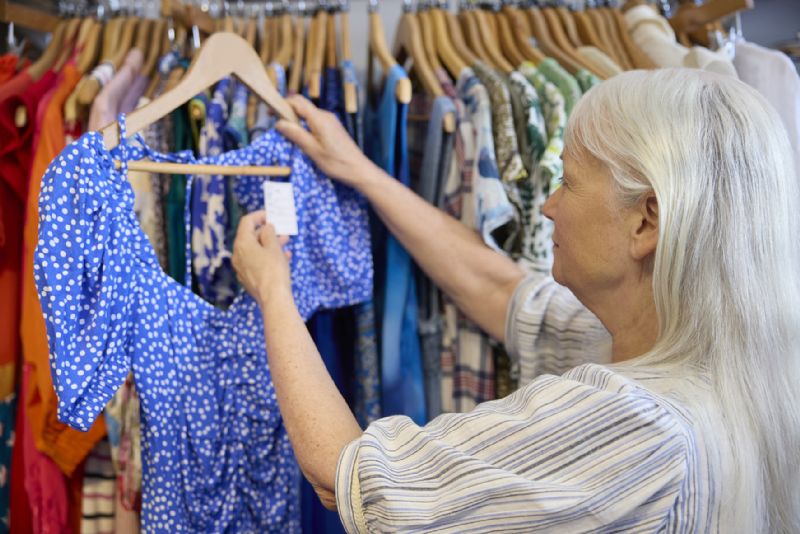- Home
- News, Articles & Reviews
We are hiring! Please click here to join our growing magazine delivery team in Gloucestershire!
Areas
Environment
Archive

Is your wardrobe costing the earth?
All Areas > Environment > Save the Planet
Author: Sara Chardin, Posted: Wednesday, 24th September 2025, 09:00
Have you ever considered what happens to your clothes once they reach the end of their life? While you might take your garments to a charity shop when you’ve finished with them, many will end up in landfill once they are no longer suitable for resale. According to Recycle Now, around 49% of all unwanted textiles in the UK get thrown into the rubbish bin every year, which equates to 35 items per person.
The era of fast fashion means many of us are encouraged into a quick cycle of buying and discarding. With new styles every week, influencer pressure and prices kept low by some retailers, fashion has become another part of the throwaway society.
Which textiles can be recycled?
Once your clothes have reached the end of their life, take them to a textile bank. These can be found at local recycling centres or in many supermarket car parks. Single-fibre fabrics, such as 100% cotton or polyester, are the easiest to recycle. It is the blended fabrics, such as a 60% cotton and 40% polyester mix, which are not likely to be recyclable and will often end up in landfill.
What can you do to help?
Nobody is perfect and many of us can’t afford to buy the ‘best’. But if you want to try and ease the burden of fast fashion, you could consider buying non-blended fabrics such as 100% cotton, linen, wool, hemp or silk, which are all easier to recycle.
The best choices for low-impact materials, according to Good On You, are recycled or organic cotton, organic linen, recycled wool, TENCEL Lyocell and recycled nylon. Lyocell is made from cellulose from wood pulp, which means the fibres are biodegradable.
What happens to recycled fabrics?
Wool can often be re-spun and re-woven into new woollen items of clothing or homeware, such as blankets or rugs. It can also be repurposed for use in industrial products such as insulation or padding.
It actually takes less energy to produce recycled polyester than it does to make virgin polyester. Recycled polyester can be spun into new clothing, used for insulating down jackets, or even turned into new products such as water bottles.
Used cotton is shredded up and spun into new yarn to create towels, blankets, underlay, nappies and cleaning cloths, amongst other things.
An eye to the future
While we can all do our bit to buy less and repair what we have, scientists are working on new fabrics for a more sustainable future. This includes mimicking a protein found in squid, which has self-healing properties and could be used to make garments that have a longer life.
Pineapple leather is becoming more widespread. Made from pineapple leaves, it is much more sustainable than traditional leather production, requiring less water and no harmful chemicals. A Singaporean company has even developed a fabric that can sequester carbon dioxide from the air. Just twenty of their t-shirts can capture the same amount of carbon as a mature tree.
So while we wait for the scientists to come up with the goods, take a look at the care label before you make your next purchase. See if it’s possible to prioritise items made from a single fibre rather than a blend. Even better, head to Vinted or your local charity shop and buy second-hand!Copyright © 2026 The Local Answer Limited.
Unauthorized use and/or duplication of this material without express and written permission from this site's author and/or owner is strictly prohibited. Excerpts and links may be used, provided that full and clear credit is given to The Local Answer Limited and thelocalanswer.co.uk with appropriate and specific direction to the original content.More articles you may be interested in...


© 2026 The Local Answer Limited - Registered in England and Wales - Company No. 06929408
Unit H, Churchill Industrial Estate, Churchill Road, Leckhampton, Cheltenham, GL53 7EG - VAT Registration No. 975613000You are leaving the TLA website...
You are now leaving the TLA website and are going to a website that is not operated by us. The Local Answer are not responsible for the content or availability of linked sites, and cannot accept liability if the linked site has been compromised and contains unsuitable images or other content. If you wish to proceed, please click the "Continue" button below:




